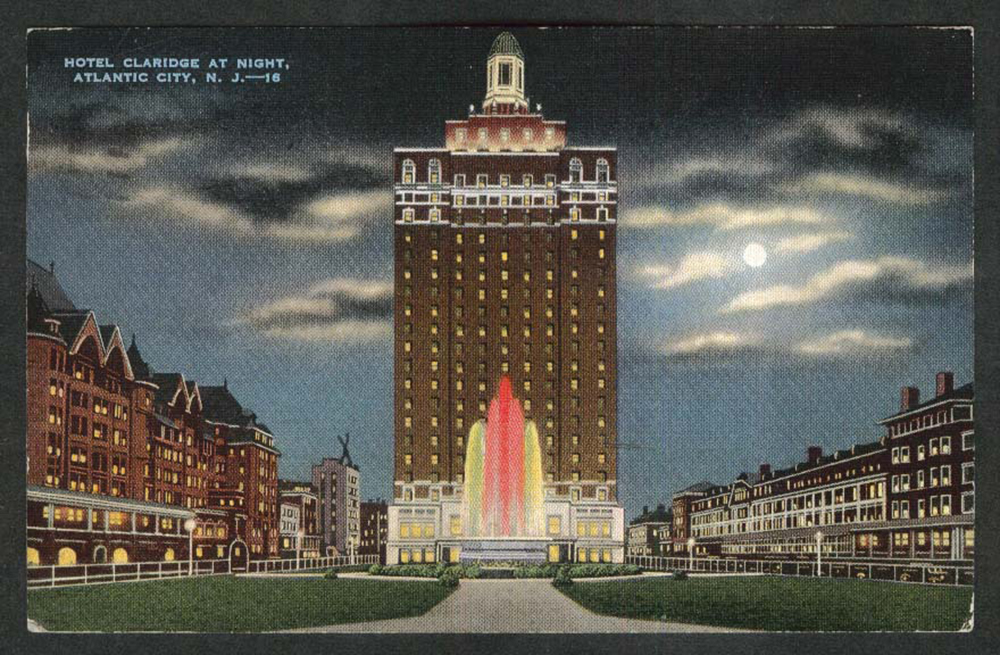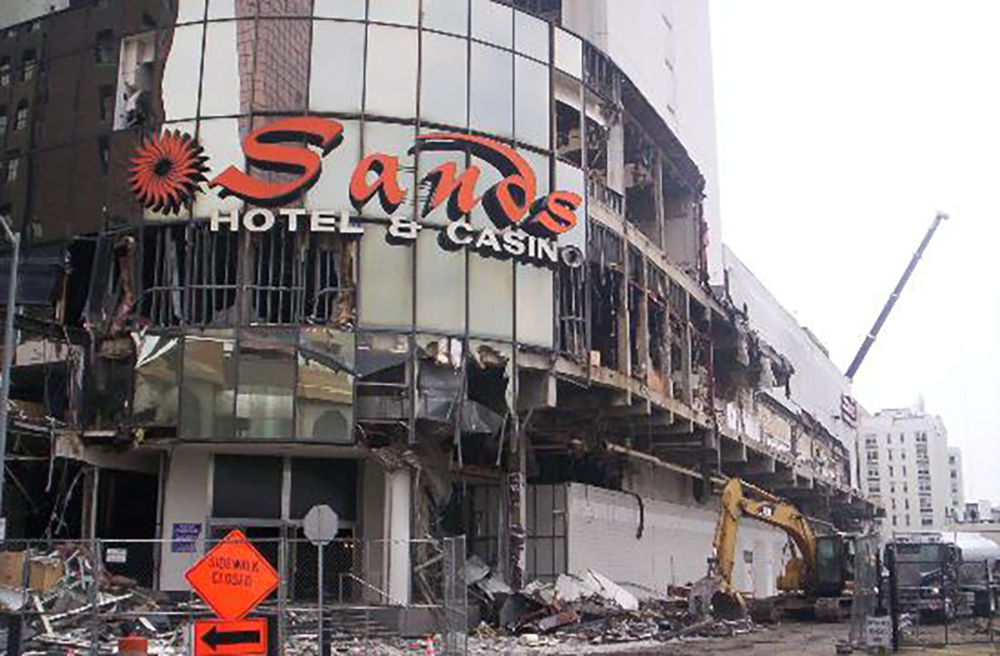By Bruce Klauber
In 1976, casino gambling was legalized in Atlantic City. After Resorts International opened its doors in 1978, the floodgates for hotel/casinos on the Boardwalk opened. Building a hotel casino, it seemed, meant instant success. For a while, it was true. Until it wasn’t.
Inevitably, due to changes in the market and the economy, and the simple fact that a town like Atlantic City just couldn’t support 10 casinos, there would be a shakeout and some just wouldn’t make the cut. Today two of the original hotel/casinos are now just hotels, three have been demolished and one has been vacant since 2014.
It’s been tough to keep track of the openings, closings, name changes and other developments in Atlantic City hotel/casino business over the past 45 years. Here’s a simplified rundown:
Golden Nugget/Bally’s Grand/Hilton/Atlantic Club
Las Vegas casino magnate Stephen Wynn came to Atlantic City in 1980 and built the Golden Nugget on the site of what once was The Strand Motel. Many in the business believed that Wynn – who insisted that everything be first class – was the best thing to ever happen to Atlantic City, and that the Boardwalk would eventually become Las Vegas East.
Though one of the smallest of the hotel/casinos on the Boardwalk, the Nugget was the shore’s top earner by 1983 and regularly presented the crème de la crème of talent, including Frank Sinatra and Dean Martin.
In 1987, upset by Casino Control Commission red tape, he sold it to Bally’s Grand and vowed to never return to Atlantic City. The venue was still the focal point of the shore’s casino business, but when Bally’s sold to Hilton in 1996, the hotel/casino began losing some of its luster.
It operated and did well under the Hilton banner until 2011, when Hilton’s licensing agreement with the holding company, Colony Capital, ended. For the last two years of its existence, from 2012 to 2014, the hotel/casino limped along as The Atlantic Club.
Since then, the vacant property has passed through several owners, and at one point, even Stockton University was close to buying the property.
Owned since 2019 by Colosseo Atlantic City, the company’s principal, Rocco Sebastiani, has made a lot of promises about the property, including transforming it into a combination of a hotel and luxury condos that would open next year. I’m looking out my window at the property right now. I can report that no work has been done on it thus far.
Brighton/Sands
The Brighton Hotel and Casino opened in August, 1980, as the fourth hotel/casino to be built in Atlantic City.
The first year was rocky until it became the Sands in 1981. The venue continued to expand in size and reputation, and for a time, was booking the top acts in show business, including Frank Sinatra, who played his last Atlantic City dates there in the summer of 1994.
Despite all kinds of improvements, the Sands just couldn’t keep up with the competition and declared bankruptcy in 1998. On Oct. 18, 2007, the Sands was imploded. A fireworks show followed.
The Claridge
The Claridge is the last of the still-operating “grand hotels” on the Atlantic City Boardwalk. Built in 1930, the hotel had 24 floors and 400 rooms. For years it was the place for celebrities to stay, and The Claridge survived and thrived through good and not-so-good days in Atlantic City. On paper, it looked like a natural to be transformed into a casino.
In July of 1981, it opened as Del Webb’s Claridge Hotel and Casino. It was a happening place for several seasons, attracted top-tier talent in the main showroom, and had a swinging, jazz-focused lounge. To the venue’s credit, it never sacrificed its historic charm.
But competition, tough times for Atlantic City casinos in general, and the comparatively small size eventually did it in. Though gaming operations stopped in 2012, The Claridge still stands, and it’s still a classic.
Trump Plaza
The Boardwalk’s Trump Plaza, initially called Harrah’s at Trump Plaza, opened with a flourish in July of 1984. From the start it just didn’t do very well, despite various expansions, presentation of championship boxing matches, and acquisitions of adjoining properties.
The issue – like the Revel in later years – was that the Plaza went after a high-roller market that didn’t exist. It closed for good on Sept. 16, 2014. Donald Trump had his name removed from the venue a month before. As one of the Boardwalk’s most embarrassing eyesores, the Plaza was finally imploded on Feb. 17, 2021.
Playboy/Atlantis
The Playboy Hotel and Casino, later the Atlantis Hotel and Casino, was my favorite place to work. I played drums with the late and great Connie Lesem in the lounges of both venues. The audiences were great and the management treated the musicians with respect, unlike the management of other casinos who would dock a musician’s pay for holding a glass of water on stage. Further, the venue was among the first to aggressively cater to the day trippers, by presenting afternoon shows exclusively for those who took the bus down to the casino for the day.
It opened in April of 1981 as the Playboy Hotel and Casino, with Playboy’s partner being the Elsinore Corporation, of Las Vegas’ Four Queens Hotel/Casino fame.
The state Casino Control Commission was okay with Elsinore, but not with the Playboy Corporation, claiming the latter was guilty of shady business practices.
It operated, solely under Elsinore’s aegis, as the Atlantis, until declaring bankruptcy in 1985. It continued operations as a casino until May of 1989, when Donald Trump bought it and operated it as a hotel as part of Trump Plaza until 1996. It closed for good three years later.
Showboat
When the Showboat Hotel and Casino opened on March 30, 1987, Atlantic City had seen nothing like it. Among other features, it had a 60,000-square-foot casino floor and a 60-lane bowling alley. The Mardi Gras-themed Showboat always did well, though the bowling alley closed in 2001, with new hotel towers being added, the addition of the still-standing House of Blues, and constant renovations and improvements.
Showboat was still making money by 2014, but Caesars Entertainment, who owned it at the end, still decided to shut it down. Coincidentally, the beleaguered Revel closed on the same day, Aug. 31, 2014.
Only months later, Stockton University made a deal to buy the Showboat and turn it into “a full-service residential campus.”
There were legal problems and the sale didn’t go through. Instead, Philadelphian Bart Blatstein, of Atlantic City’s failed “Playground” fame, bought the Showboat for $23 million in July of 2016.
To his credit, Blatstein has made something unique out of the property. The Showboat has hosted major events, and features like the Island Water Park and the Lucky Snake Arcade represent Blatstein’s considerable efforts to make Atlantic City a year-round resort destination.
Showboat does well as a non-casino hotel, and also offers beachfront apartment homes at relatively reasonable prices for oceanfront residences.
And all the rest:
Trump Castle/Taj Mahal/Revel
The marina’s Trump Castle opened in 1985, changed the name to Trump Castle in 1997, and became the Golden Nugget in 2011.
Trump’s Taj Mahal, which opened in 1990, was built at the then-staggering cost of $1 billion. It closed in 2016 and opened two years later as the Hard Rock Hotel & Casino, which has become one of the most successful hotel/casinos in Atlantic City.
The Revel Casino Hotel stands as one of the biggest mistakes in hotel casino history. Everything about it, from the location of the casino floors to the prices in the restaurants, was wrong.
Revel, which cost $2.4 billion to build, opened in 2012, closed two years later, and stood vacant until 2018 when it opened as Ocean Resort Casino. There were those in the casino business community who firmly believed that the Revel was simply a failure that was waiting to be imploded. Instead, it became one of the biggest and most unlikely success stories in Atlantic City hotel/casino history.
And what does this prove? That anything can – and likely will – happen in Atlantic City.
Bruce Klauber is the author of four books, an award-winning music journalist, concert and record producer and publicist, producer of the Warner Brothers and Hudson Music “Jazz Legends” film series, and a working jazz drummer and vocalist since childhood. He served as Technical Adviser on the Oscar-winning film, “Whiplash,” and on the 2018 Mickey Rourke film, “Tiger.” He has been honored by Combs College of Music and Drexel University for his “contributions to music journalism and jazz performance.”











